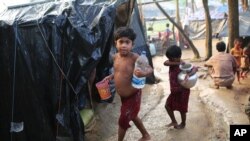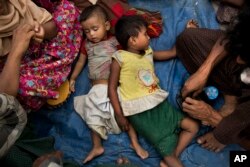Life-threatening malnutrition rates are soaring among the children of Rohingya refugees in Bangladesh, who fled Myanmar to escape violence, according to a nutritional assessment by the U.N. children's fund.
The recently conducted survey in the Kutupalong refugee camp in Cox's Bazar shows 7.5 percent of Rohingya refugee children suffer from severe acute malnutrition. UNICEF says this is at least two times higher than what was seen among the children in May — about four months before the mass exodus of Rohingya from Myanmar's northern Rakhine state began.
UNICEF spokesman Christophe Boulierac says children with severe malnutrition risk dying from the preventable, treatable condition.
"Malnutrition rates among children in northern Rakhine were already above emergency thresholds," Boulierac said. "The condition of these children has further deteriorated due to the long journey across the border and the conditions in the camps."
More than 600,000 Rohingya have fled violence and persecution in Myanmar since August 25. Approximately 25,000 live in the Kutupalong camp, where the nutritional assessment was carried out. UNICEF says the refugees face an acute shortage of food and water. That problem, coupled with the unsanitary conditions, is giving rise to high rates of diarrhea, respiratory infections and other ailments.
Boulierac says more than 2,000 acutely malnourished children are being treated by UNICEF and partners at 15 centers. He tells VOA more treatment centers are being set up, but not fast enough to help some 17,000 other youngsters in need of specialized nutritional feeding.





